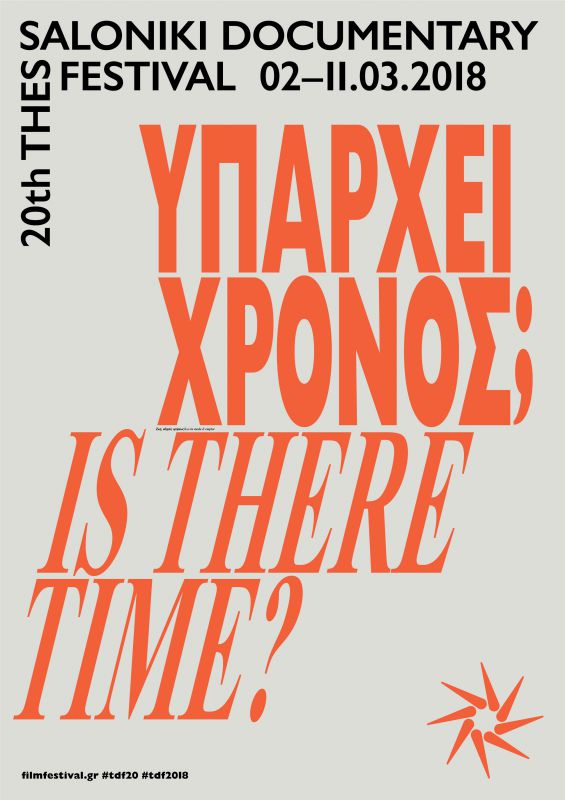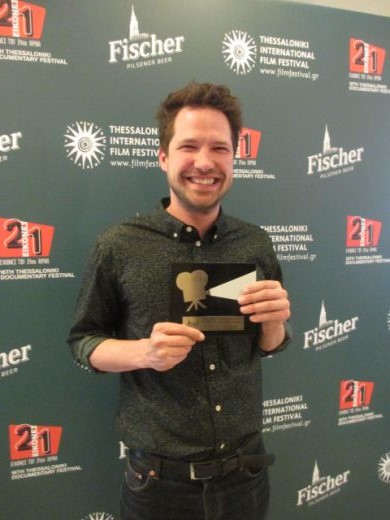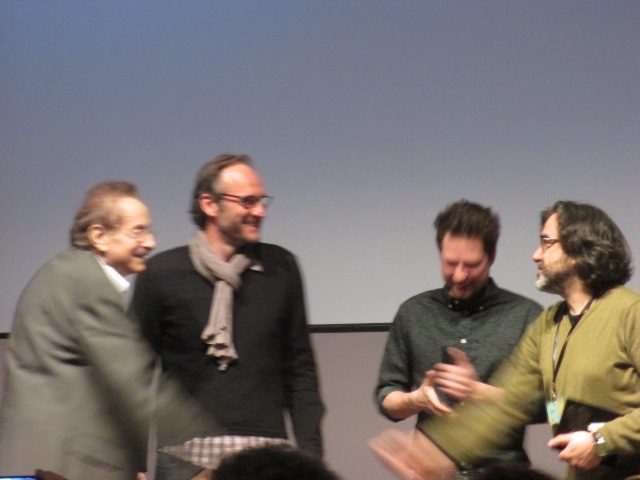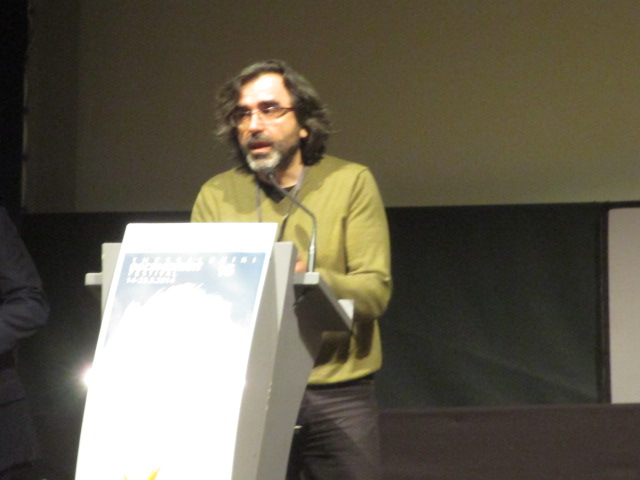|
|
||
|
Pro Tools
FILMFESTIVALS | 24/7 world wide coverageWelcome ! Enjoy the best of both worlds: Film & Festival News, exploring the best of the film festivals community. Launched in 1995, relentlessly connecting films to festivals, documenting and promoting festivals worldwide. Working on an upgrade soon. For collaboration, editorial contributions, or publicity, please send us an email here. User login |
MY SWEET CANARY, Interview with Roy Sher
MY SWEET CANARY (Israel, France, Greece, 2011) by director Roy Sher opened the 13th Thessaloniki Film Festival at the Olympian theater to a sold out audience on March 11th, 2011 and screened again on March 15th. The energy and excitement of the audience began with the presentation of the film by the director and sustained right to the end. Filmed in Turkey, Greece, Israel and England, MY SWEET CANARY is a purely captivating story about history, love, art, passion and vibrant radiant soul lifting Ribetiko music; last but not least, this is film is about the inspiring life and unrivaled passion of one of Greek’s most beloved singers to date, Roza Eskenazi. Set between Istanbul, Athens and Thessaloniki it follows Roza’s life from her childhood to her death- the battles she fought, the life she lived and the legacy she left behind, whose spirit lives on in the hearts and minds of Greek, Turkish and Jewish descendants everywhere. I interviewed Roy about his emotionally stirring and stimulating film. He told me that he enjoyed the interview because it made him go back in time to the memories of his life while making this film, the good moments and the bad.
ME: Hi Roy. So, can you start by telling us how you came up with the title, MY SWEET CANARY? ROY: The film is called like one of Roza's most famous songs- "Kanarini mou glyko"/ My Sweet Canary. I think that it was one of the first decisions we made about the film- to call it like that. It was just a perfect name for me and the most I got to know Roza and her music, it fitted even better. ME: How did you meet the beautiful singers featured in your film, Mehtap and Martha? ROY: Since I understood that the music is going to play an important role in the Film, I thought that it should be led by a group of Musicians. I thought they would be able to lead the viewer safely through this journey. I also wanted to reflect in the selection I made of the musicians, Roza's Cosmopolitan and diverse cultural background. Tomer Katz, the Israeli musician, is the leader of an Israeli Rebetiko band. It was his band through which I first learned to love and appreciate this music, so he was a natural choice. Mehtap Demir is a wonderful musician from Istanbul that I have met in Israel. She was writing her PHD here on the subject of the influence of Ottoman music on contemporary Israeli music. Apart from being an excellent musician, she is also an Anthropologist and so she related to the idea and at the same time, was very knowledgeable about the music and its influences. Martha Demetri Lewis lives in London, where she was born and raised to a Greek-Cypriot family. Her Grandparents were refugees and she combines the Greek culture and music in to the music she does, which is more sort of blues and Jazz. Nevertheless, she had made a documentary for the BBC radio about Roza a couple of years ago, and this is how I found her. She was very interested in the relations between the Rebetiko and the blues, and of course, this was for her a journey to find her cultural roots. ME: How many countries did you film this in and what kind of impact did all the travel have on the difficulty in the production of the film? ROY: We filmed in 4 countries: Israel, Turkey, Greece and the UK. The stuff from the UK did not remain in the film eventually. We filmed around 160 hours of materials. As far as the budget went- it was very expensive especially in the 15 shooting days we did in Turkey and Greece filming the musical scenes. I did not have any money back then (it was November 2009) and I used my own money as well-as loans that I took to pay for it. The co-producers started to join only later on... ME: Can you speak about the many different languages in the film and if you had difficulties understanding each other at times? ROY: I think that for me that was the biggest challenge in this production: to put on a team of Israelites, Greeks and Turkish people with no money in the beginning, who decided to join us because they liked the music, the culture and the spirit of our production. Technically, I have learned so much, being also the producer of the film, on how to manage an international team with the cultural differences and the small sensitivities that everyone has. So there are differences of course, but what I really found out is that we share some Mediterranean characteristics in this "neighborhood" and that people everywhere are very much alike. ME: When did you first travel to Thessaloniki and can you speak about your love affair with Roza’s legendary voice and her unmatchable legacy? ROY: I was first in Thessaloniki on March 2009 for the research for the Film. As far as Roza goes, I think that the 2 main things that drew my attention to Roza's story (in this order..) are the fact that I am always interested and drawn to strong/individual woman characters, and the fact that I realized, from her name of course, that she was Jewish, which was not a common thing those days in the Rebetiko/ Smyrneiko scene. When I first heard Roza, after buying a compilation of her songs, I had a really a hard time listening to her, due to my western music tuned ears. So then I started to follow her story and life and since there was hardly any information I could find, I realized that the most important source, probably, would be the music she left us. So I went back to the music and slowly, but very strongly- fell in love with it. As the time passed, I learned to identify the nuances in her voice that are unique to her as a Turkish born Jew who then rose to fame and made her career in Greece. There might have been greater singers in the genre, but none had the special sound and quality that Roza had, in my view. ME: Why did you choose to make a documentary story about her rather than a narrative feature? ROY: It's an interesting question. I thought about it at the time and it certainly can be a great feature film. The truth is that when I started the project, I was a total stranger in Greece and in the Greek culture. I was not realistic back then to write a script in Greek, especially not a script that is so culturally and historically particular, about a world that I know so little about. So basically I decided, in the beginning, to tell Roza's story from the POV's that have caught my attention: The story of the woman, the music and the cultural background. Of course as I got deeper and deeper into researching her life, many things have changed, but this was the original reason for this decision regarding the genre of the film. I am happy with it. ME: Would you say that in telling the ‘truth’ through a documentary film, that it captures truth or that in a way this is perhaps your truth and that if someone else made a documentary about Roza they might represent her in a completely different way? This might seem like a stupid question but I'm always interested to hear what people say about docs and fiction film in the matter of the representation of truth. ROY: I am also interested in that.. and I, also, don't know what the truth is. Docs are as fictitious as any fiction film. The decision of the film maker is not what to include in the film, but rather, what to live out. So every doc is basically much more "scripted" many times then any 'fiction" film that has much fewer options to cut out from. I am not sure that today, even the issue of total control that the director of the fiction film supposedly has over a shot, if these two main cinematic perceptions even differ. I think the difference hardly exists. ME: What was it like to screen your film in Thessaloniki and how was your film and your team received? ROY: Thessaloniki was a great experience. It’s a unique one as well. I think that screening the film to a Greek speaking audience is something that will always give us enormous pleasure. Sitting in a full cinema with all the people singing the songs and reacting to the scenes was great. I can just hope that in other countries it will be the same (but I know it won't...). ME: How has this film impacted the singing careers of the women singing in your film? And how has it impacted yours? ROY: As far as the participants of the film- since it was just our first screening- it is far too soon to know. About my life…(Stay tuned)... :-) ME: Do you have another project in mind or will you follow this film first for a while before beginning your next project? ROY: I am producing this project that consists of the film, the soundtrack CD which we have just released and of course the My Sweet Canary Concert Tour, which we hope to promote, along with the film all over the world in the next year. We already secured some concerts in Greece, Israel and North America, so I have a long and hard year ahead, traveling and promoting this project. I am really excited about it. ME: Wow! Congratulations! I’m honored that I got to attend one of your first screenings and to be one of the first on what promises to be a year full of attention for your exhilarating documentary about Roza Eskenazi. It seems to be a match made in heaven as from the time that Roza’s voice became your muse and you decided to bring her story to the world, your names have now become forever entwined. I wish you the best of luck and praise for MY SWEET CANARY.
Interview conducted by Vanessa McMahon, March 25, 2011
Q and A from screening: http://www.fest21.com/en/blog/thessaloniki/my_sweet_canary_q_and_a
My Sweet Canary: A journey through the life and music of Roza Eskenazi Visit us on our web site at: http://mysweetcanary.com or on Facebook at: http://www.facebook.com/pages/My-Sweet-Canary-The-story-of-Roza-Eskenazi... Email us at: mysweetcanaryfilm@gmail.com director Roy Sher Roy, Martha, Mehtap after screening of film in Thessaloniki 26.03.2011 | Thessaloniki's blog Cat. : Anthropologist Athens BBC Contact Details Director energy Entertainment Entertainment Europe European people Facebook film maker France Greece Greece http://mysweetcanary.com http://www.facebook.com/pages/My-Sweet-Canary-The-story-of-Roza-Eskenazi http://www.fest21.com/en/blog/thessaloniki/my_sweet_canary_q_and_a interview with Roy Sher Israel Istanbul Jew leader London Martha Demetri Lewis Mediterranean Mehtap musician MY SWEET CANARY mysweetcanaryfilm@gmail.com North America Person Attributes Person Career Person Location Producer Quotation Rebetiko Roy Sher Roza Eskenazi Roza Eskenazi Technology Technology the 13th Thessaloniki Film Festival Thessaloniki Tomer Katz Turkey United Kingdom Vanessa McMahon PEOPLE
|
LinksThe Bulletin Board > The Bulletin Board Blog Following News Interview with EFM (Berlin) Director
Interview with IFTA Chairman (AFM)
Interview with Cannes Marche du Film Director
Filmfestivals.com dailies live coverage from > Live from India
Useful links for the indies: > Big files transfer
+ SUBSCRIBE to the weekly Newsletter Deals+ Special offers and discounts from filmfestivals.com Selected fun offers
> Bonus Casino
User imagesAbout Thessaloniki Mcmahon Vanessa Mcmahon Vanessa Vanessa McMahon Covered the 13th and 14th, and 16th edition. Through its tributes, it focuses both on discovering filmmakers with a unique cinematic point of view, and on the internationally recognized for their contribution to documentary. Contributions from Buno Chatelin http://tdf.filmfestival.gr/default.aspx?lang=en-US&loc=6&page=760 View my profile Send me a message My festivalThe EditorUser contributions |




























